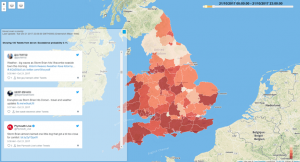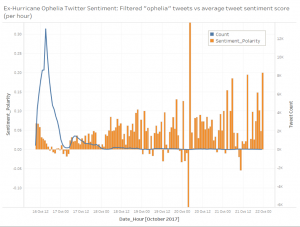Michelle Spruce recently presented some of her research on social sensing of extreme weather events at the Royal Meteorological Society’s public ‘Weatherlive’ conference in November 2018. She also discusses her work on the ‘Paul Hudson Weather Show’ which broadcasts on BBC Radio Leeds, York, Sheffield, Humberside, Lincolnshire and online in early December.
Her research uses Twitter data collected during the period of the 2017/2018 UK storm season (Autumn 2017 to Spring 2018). Building on the work already done in the research group on the social sensing of floods and hayfever/pollen, this study aims to determine the social impacts of named storms in the UK and Ireland. Storms are named when they are forecast to cause moderate to severe impacts. To improve data quality, tweets are filtered for relevance to the named storm event using simple text filters and a more complex Naïve Bayes machine learning approach. After removing irrelevant tweets, we find peaks in Twitter activity which correspond to the time period of the storm. Using the filtered data, we also calculate a sentiment score (how positive or negative the tweet text is) over time. We find tweets becoming less positive during and in the hours after the peak of stormy weather. Categorisation of tweet content during the storm period also finds more than a quarter of tweets are grouped within the ‘humour category’, and a further fifth of tweets reporting on damage or disruption. Using the findings from this research will help to better inform impact based weather forecasting and also provides an additional forecast validation tool.
Michelle is hoping to submit her findings to a relevant journal for publication shortly.



